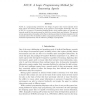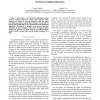726 search results - page 26 / 146 » Reasoning about Feature Models in Higher-Order Logic |
CORR
2004
Springer
13 years 8 months ago
2004
Springer
FLUX is a programming method for the design of agents that reason logically about their actions and sensor information in the presence of incomplete knowledge. The core of FLUX is...
JFP
2006
13 years 8 months ago
2006
The Theory of Contexts is a type-theoretic axiomatization aiming to give a metalogical account of the fundamental notions of variable and context as they appear in Higher stract S...
ATAL
2005
Springer
14 years 2 months ago
2005
Springer
Rational strategic reasoning is the process whereby an agent reasons about the best strategy to adopt in a given multi-agent scenario, taking into account the likely behaviour of ...
CORR
2011
Springer
13 years 3 months ago
2011
Springer
—We present a new model for distributed shared memory systems, based on remote data accesses. Such features are offered by network interface cards that allow one-sided operations...
JOLLI
2006
13 years 8 months ago
2006
Abstract. Propositional dynamic logic (PDL) provides a natural setting for semantics of means-end relations involving non-determinism, but such models do not include probabilistic ...


